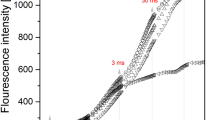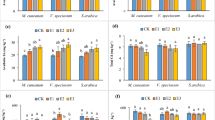Abstract
IT has been recognized in the literature that an excess of either manganese, zinc, copper, cobalt or nickel will induce iron-deficiency chlorosis in plants. Other toxic effects such as stunting and lower leaf necrosis may also occur. These effects have been confirmed in water-culture experiments with flax, conducted at the Plant Research Laboratory, Department of Agriculture, Burnley, Victoria.
This is a preview of subscription content, access via your institution
Access options
Subscribe to this journal
Receive 51 print issues and online access
$199.00 per year
only $3.90 per issue
Buy this article
- Purchase on SpringerLink
- Instant access to full article PDF
Prices may be subject to local taxes which are calculated during checkout
Similar content being viewed by others
Author information
Authors and Affiliations
Rights and permissions
About this article
Cite this article
MILLIKAN, C. Antagonism Between Molybdenum and Certain Heavy Metals in Plant Nutrition. Nature 161, 528 (1948). https://doi.org/10.1038/161528a0
Issue date:
DOI: https://doi.org/10.1038/161528a0
This article is cited by
-
Reciprocal effects of copper and zinc in plants
International Journal of Environmental Science and Technology (2022)
-
Nickel in plant growth and metabolism
The Botanical Review (1974)
-
The influence of molybdenum on iron nutrition of tomato
Plant and Soil (1967)
-
Manganese toxicity in field and market garden grops
Plant and Soil (1951)
-
Relation of Molybdenum and Manganese to the Free Amino-Acid Content of the Cauliflower
Nature (1949)



